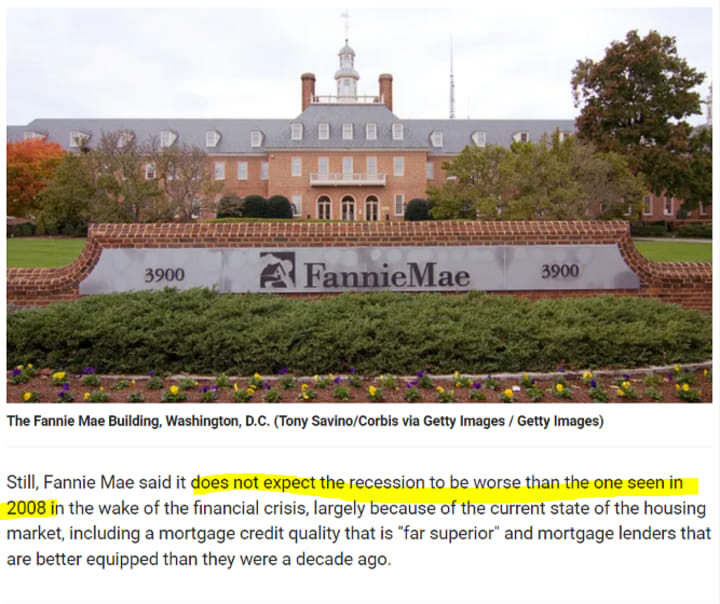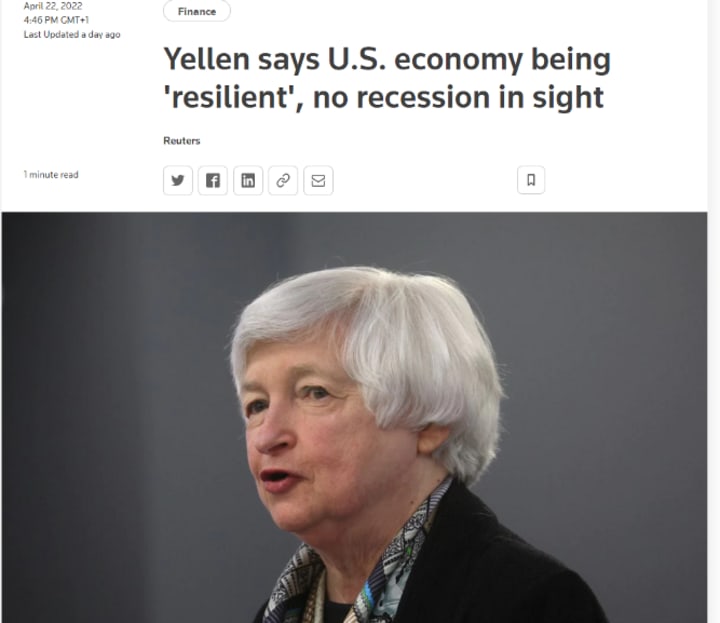
Here is the latest news from Fannie Mae. If you are like me when I first heard of it wondering if this is a person or a financial expert it's actually a government-sponsored enterprise "The Federal National Mortgage Association (FNMA)".


Inflation
Earlier in 2022, Fannie Mae predicted inflation of around 7%, Here was the inflation rate in the first quarter of the year thus far:
- 7.5% in January 2022
- 7.9% in February 2022
- 8.5% in March 2022
This averages out to 8% relatively close to their prediction.
Here's what Fannie Mae says
Let's break it down so it's simple to understand, without the overcomplicated financial jargon that we often hear about.
- The stock market does something every 10 years. Every 10 years it makes money for people, and then for the next 10 years, they lose money. And then the next 10 years they make money, and after that the next 10 years they lose money.
- The cycle keeps repeating itself over and over again.
Let's look at the history

From 1989–to 1999: The stock market returned 16.7%.
Incredible period to be an investor.
From 2000–to 2011: The stock market returned -0.13%.
Yes, you read that right it's a negative amount. It's not a massive amount to lose, but it's a decline in investment. To put it into perspective, imagine putting it $1,000 (in the year 2000) and after 10 years (in the year 2009) finding out that your $1,000 is worth only $998.70. You would be so discouraged, and most people quit.
From 2011–to 2021: The stock market returned 13.2%.
However, if you held on to that same $1,000 into the years 2011–2021 it would have provided you with a return of 13.2%, providing you with $1,132 on your investment.
The stock market gives and takes.
In 2022–2032: The stock market could either stay flat or go down
Only time will tell.
Soft landing
Inflation is telling the federal reserve that it is really expensive to live life fast, faster than we expected. Hence, the federal reserve's response with tighter monetary policy is by way of increasing interest rates is going to threaten the soft landing without causing a recession.
Historically speaking soft landings are extremely rare. Below is a graph from Fannie Mae to give you an idea of the effect of inflation and the landings.

- From 1955 to 2019 we have had 10 hard landings.
This means every time we try to slow down inflation by increasing interest rates we have had 10 hard landings (denoted by the red arrows in the image), meaning we hit recession 10 times.
In that same period, we only have 3 soft landings (denoted by the green arrows in the image).
Here's why:
The technical term for this is the end of the monetary expansion cycle.
Expansion is the phase of the business cycle where the real gross domestic product (GDP) grows for two or more consecutive quarters, moving from a trough to a peak. Expansion is typically accompanied by a rise in employment, consumer confidence, and equity markets and is also referred to as an economic recovery.
Contraction is when the economy weakens, staff lay off, and companies stop hiring. The low point (trough) is when the economy hits rock bottom.
Below will give you an idea of the expansion, peak, contraction and trough to better understand the Fannie Mae graph on inflation and landings.

Don't worry if the technical term gets confusing, it took me some time to understand it as well.
How do you know we are at the end of a monetary expansion cycle?
Like the weather, the economy is believed to follow a cyclical path that continues to repeat itself over time.
According to CNBC, 81% of U.S adults believe a recession is coming. Former U.S Treasury head Larry Summers also agrees recession is the most likely thing. On the other hand Yellen, U.S Treasury Secretary does not foresee it tipping into recession



What can you do?
- Save money.
- Invest in alternative investments.
- If you are young, you have the luxury of time to ride the stock market movements. Hence, do nothing and continue investing.
- If you are older, you may not have the luxury of time for the stock market to recover, in which case consider lower risk inflation like bonds eg I bonds.
Conclusion
The truth is everything discussed in this article is not an exact science, it's more of an interpretation of the economy based on an amalgamation of interpretation and statistics looked at. Hence, you may have formed your own opinion if a recession is likely or not likely to happen in the next year or so.
That's why economists disagree with each other all the time despite looking at the same data, different economists draw different conclusions. This is because some of them may look at a data and say "this is how we know a recession is coming", whereas the other half may say you're taking several things that happen to correlate and you are trying to extrapolate something to predict the future, but it happened in the past, and this doesn't mean it will happen in the future.
Regardless, it's best to keep an open mind and be prepared for what lies ahead.
----------------------------------------------------------------------------------------
If you would like to support my writing, please consider liking my story, subscribing, pledging and/or tipping. Thank you for reading!






Comments
There are no comments for this story
Be the first to respond and start the conversation.